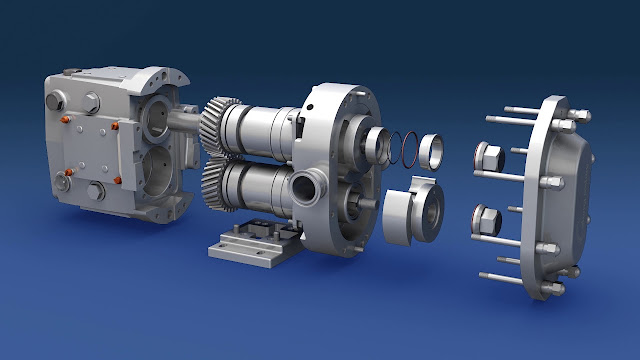 |
| Positive Displacement Blowers Market |
Positive displacement blowers are mechanical air compressors or vacuum pumps primarily used to generate and deliver a constant high volume of air flow at a specific pressure. These blowers utilize oil-sealed rotary, reciprocating, liquid ring, or regenerative-design mechanisms to generate compressed air or vacuum. They allow for precise pressure control and accurate delivery through their inherent design and operating principle. Positive displacement blowers find application across various end-use industries such as oil and gas, petrochemical, chemical, food processing, power generation among others. Growing demand from oil and gas industry owing to increasing drilling and exploration activities is expected to drive the growth of positive displacement blowers market during the forecast period.
The Global Positive Displacement Blowers Market is estimated to be valued at US$ 2.31 Bn in 2024 and is expected to
exhibit a CAGR of 5.1% over the
forecast period 2024 to 2031.
Key Takeaways
Key players operating in the Positive Displacement Blowers market are Hitachi
Ltd., Busch SE, Gardner Denver, Eurus Blowers, Howden Group, Aerzen, Tuthill
Corporation, AMCL Machinery Limited, Kaeser Kompressoren, Airtech Blower
Industries, Greatech Machinery Industrial Co. an Ltd. Hitachi Ltd. is one of
the leading player in positive displacement blowers market with strong
distribution network across regions.
The key opportunities in the Positive
Displacement Blower Market Trends include rising demand from food processing
industry for aseptic packaging applications and increasing focus on developing
energy efficient blowers. Geographical expansion into emerging economies of
Asia Pacific and Latin America presents lucrative growth prospects for positive
displacement blowers manufacturers.
Global expansion in terms of production facility, mergers & acquisitions
and partnerships is expected to remain key strategy of top players to gain
higher market share. For instance, in 2022, Gardner Denver announced plans to
establish a new aftermarket facility in Oklahoma to better serve customers in
central US region.
Market drivers:
- Growing oil and gas industry: Rising demand from oil & gas industry for
drilling and exploration activities is expected to drive the growth of positive
displacement blowers market.
Market restrain:
- High maintenance cost: Positive displacement blowers require frequent
maintenance and have high operational costs which may hamper the market growth
to some extent.
Segment Analysis
The positive displacement blowers market can be segmented by product type into
lobe blowers, screw blowers, and roots blowers. Among these, roots blowers
dominate the market with a share of around 40%. Roots blowers work on the
principle of rotary positive displacement and have high efficiency. They can
handle large quantities of air and a wide range of pressures, which makes them
more suitable for heavy industrial applications.
The market can also be segmented by end-use industries into oil, gas, and
chemical industry, cement industry, food and beverage industry, power
generation industry and mining industry. The oil, gas and chemical industry
dominates the market due to extensive usage of positive displacement blowers in
processes like liquefaction of natural gas and transportation of gas through
pipelines.
Global Analysis
Regionally, Asia Pacific dominates the positive displacement blowers market
with a share of over 35%. Rapid industrialization and growth of key end-use
industries like oil and gas, chemical, and power generation in countries like
China, India, Indonesia and Malaysia are driving the market in the region.
China and India are the fastest growing markets in the region.
Europe is another major regional market for positive displacement blowers due
to large processing industries. Stringent regulations regarding emission
standards are also pushing manufacturers to incorporate technologically
advanced blowers. Meanwhile, North America is expected to experience steady
gains in coming years due to strong oil and shale gas extraction activities in
the US.



0 Comments